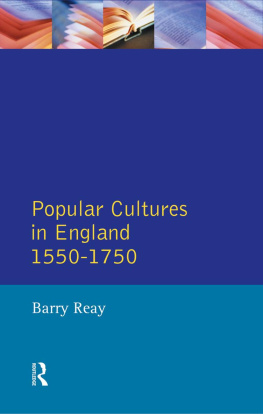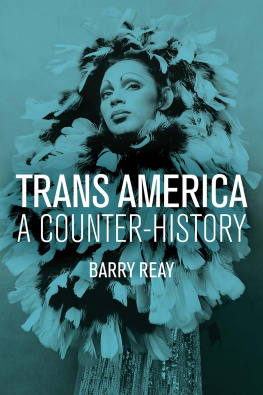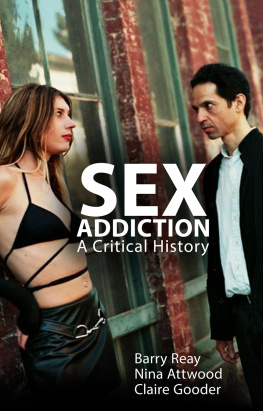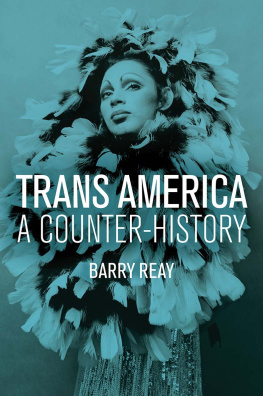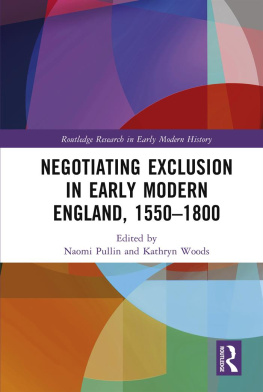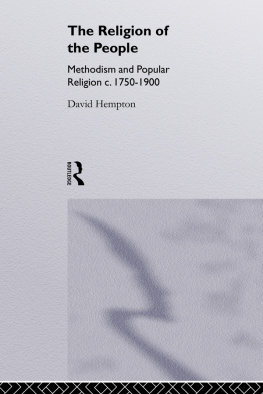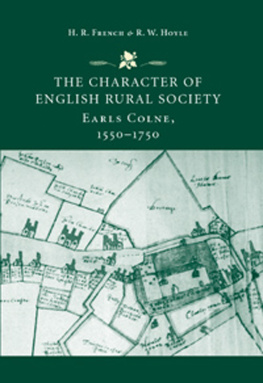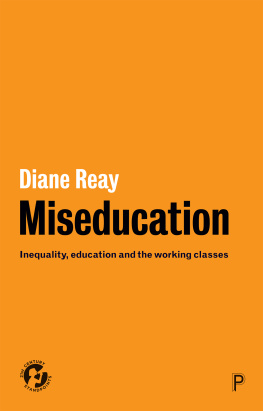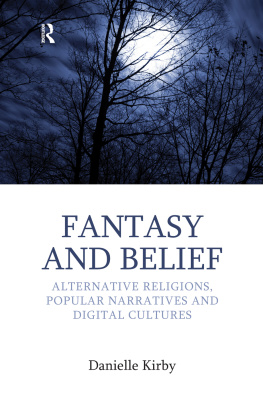Popular Cultures in England 15501750
THEMES IN BRITISH SOCIAL HISTORY
edited by John Stevenson
This series covers the most important aspects of British social history from the Renaissance to the present day. Topics include education, poverty, health, religion, leisure, crime and popular protest, some of which are treated in more than one volume. The books are written for undergraduates, postgraduates and the general reader, and each volume combines a general approach to the subject with the primary research of the author.
Currently available
THE ENGLISH FAMILY 14501700 Ralph A. Houlbrooke
POVERTY AND POLICY IN TUDOR AND STUART ENGLAND Paul Slack
CRIME IN EARLY MODERN ENGLAND 15501750 J.A. Sharpe
POPULAR CULTURES IN ENGLAND 15501750 Barry Reay
GENDER IN ENGLISH SOCIETY, 16501850: The Emergence of Separate Spheres? Robert Shoemaker
LITERATURE AND SOCIETY IN EIGHTEENTH-CENTURY ENGLAND W.A. Speck
CRIME AND SOCIETY IN ENGLAND 17501900 (Second Edition) Clive Emsley
THE LABOURING CLASSES IN EARLY INDUSTRIAL ENGLAND 17501850 John Rule
POPULAR DISTURBANCES IN ENGLAND 17001832 (Second Edition) John Stevenson
SEX, POLITICS AND SOCIETY: The Regulation of Sexuality since 1800 (Second Edition) Jeffrey Weeks
THE WORKING CLASS IN BRITAIN 18501939 John Benson
THE RISE OF THE CONSUMER SOCIETY IN BRITAIN 18801980 John Benson
HEALTH AND SOCIETY IN TWENTIETH-CENTURY BRITAIN Helen Jones
LAND AND SOCIETY IN ENGLAND 17501980 G.E. Mingay
Popular Cultures in England 15501750
BARRY REAY
First published 1998 by
Addison Wesley Longman Limited
Published 2014 by Routledge
2 Park Square, Milton Park, Abingdon, Oxon OX14 4RN
711 Third Avenue, New York, NY, 10017, USA
Routledge is an imprint of the Taylor & Francis Goup, an infonna business
Addison Wesley Longman Limited 1998
All rights reserved; no part of this publication may be reproduced, stored in any
retrieval system, or transmitted in any form or by any means, electronic,
mechanical, photocopying, recording, or otherwise, without either the prior
written permission of the Publishers or a licence permitting restricted copying
in the United Kingdom issued by the Copyright Licensing Agency Ltd,
90 Tottenham Court Road, London WlP 9HE.
British Libraly Cataloguing in Publication Data
A catalogue entry for this title is available from the British Library
Libraly of Congress Cataloging-in-Publication Data
Reay, Barry.
Popular cultures in England, 15501750 / Barry Reay.
p. cm. (Themes in British social history)
Includes bibliographical references (p. ) and index.
1. Popular cultureEnglandHistoy17th century. 2. Popular cultureEnglandHistory16th century. 3. Popular cultureEnglandHistory18th century. 4. EnglandSocial life and customs17th century. 5. EnglandSocial life and customs16th century. 6. EnglandSocial life and customs18th century.
I. Title. II. Series.
DA32O.R43 1998
306.0942dc21
98-16046
CIP
ISBN 13: 9780-582-48954-7 (pbk)
Set by 35 in 10/12pt Baskerville
Produced by Addison Wesley Longman Singapore (Pte) Ltd.,
To University of Auckland history students:
past, present, and future
Contents
This book has had an unusually long gestation but a rather short, and not too uncomfortable, birth. Both processes were eased by the support networks of family, friends, and colleagues. You know who you are; and I would like to start by thanking you warmly.
Popular Cultures was created in a relatively short period of time: I wrote . David Cressys new work on ritual and the life-cycle came out as I finished the final draft! I am greatly in debt, then, to the work of other scholars. This book could never have been written without their labours.
My thanks also go to the editor of this series, John Stevenson, and to the publishers editorial director, Andrew MacLennan, for their persistence, patience, and good humour.
Finally, I am immensely grateful to the history students of the University of Auckland. Not just to the waves of undergraduates who have studied and engaged with early modern history, and kept me on my toes, but the graduates not just early modernists who make the job seem so worthwhile. In appreciation, this book is dedicated to them.
Auckland
September 1997
Stuart Hall once said that he had many problems with the term popular and even more with the word culture: When you put the two terms together, the difficulties can be pretty horrendous.1 Past popular cultures are best known through description and example, by the historically crafted fiction of experience, rather than by crude definition. However, it is necessary to provide readers with at least a working definition lest I suffer the fate of the editors of a book called Rethinking Popular Culture, whose reviewer, having read the compendious volume, remarked that he was no clearer about what popular culture is.2 Popular cultures refers to widely held and commonly expressed thoughts and actions. We will be exploring what have been termed structures of feeling and systems of meaning: attitudes and values expressed performatively, symbolically, orally, and in writing. We will be covering both belief and behaviour. While the focus is necessarily on those below the level of Englands social elite in rural and urban early modern England, the bulk of the population, it is only a focus. Common cultural values spill across tidy social demarcations. The term popular cultures is not intended to imply some firm, exclusive division between popular and elite, high and low, great and little, or learned and unlearned. Nor is it to be taken to indicate cultural homogeneity among the subordinate: the s in cultures represents the subcultural splinterings (or segmentation) of locality, age, gender, religion, and class. The key-words for this history are: ambiguous, complex, contradictory, divided, dynamic, fluid, fractured, gendered, hybrid, interacting, multiple, multivalent, overlapping, plural, resistant, and shared.
We will return to definitions and different approaches to popular cultures in the final chapter (
The aim of this book is not to provide a complete cultural history of the early modern world the generality of such a survey would lose all analytical meaning but to explore some of the more important aspects of early modern popular cultures. I have deliberately chosen areas where there is a sophisticated historiography: the selection of topics indicates the richness of historians work as much as any personal choice of what the important topics are. I have attempted to combine secondary and primary sources to give readers a feel (mediated, of course) for early modern languages of description. Hence the detailed document analysis or evocation with which most chapters begin. While the end product is a textbook synthesis, I have tried to give a different twist to each chapter. Individual chapters could therefore stand on their own, as essays, although together they provide a sustained examination of early modern popular cultures. In fact they can be seen as demonstrating different facets of early modern culture. (the concluding chapter) returns to definitions and approaches.


